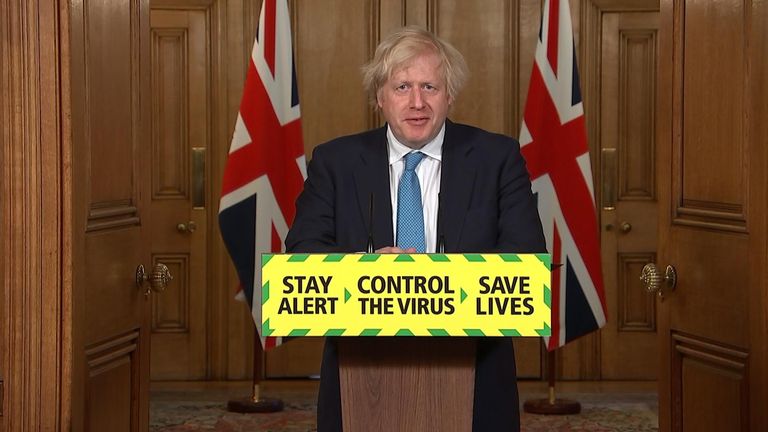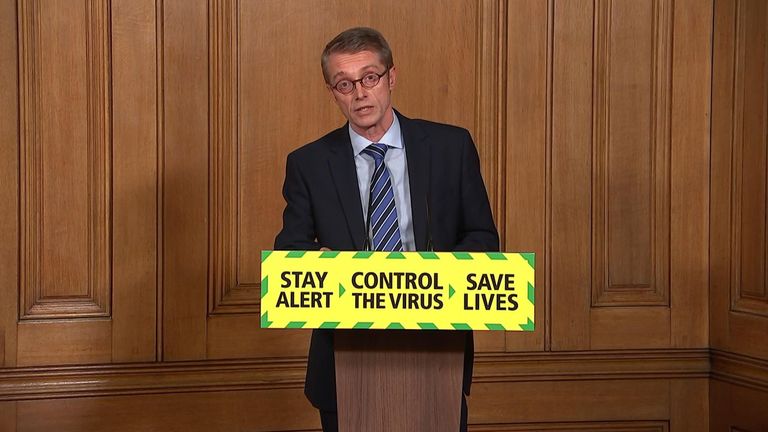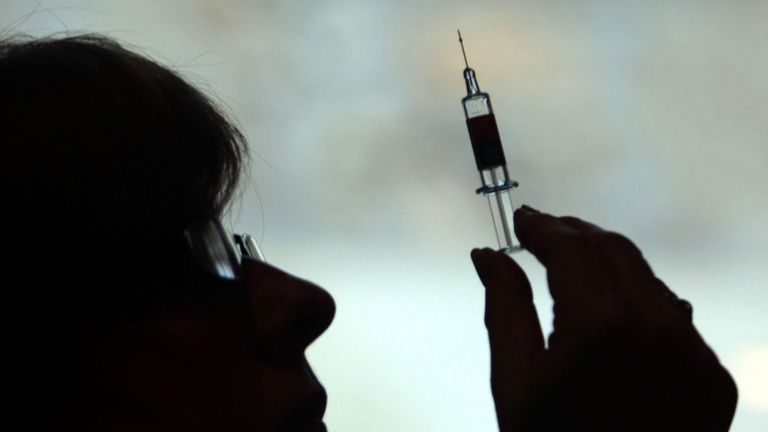The discovery of the common steroid dexamethasone as a treatment for coronavirus has been hailed as a "major breakthrough".
Having been available for decades, it is relatively cheap and readily available.
But what is the drug's history, what did research around its effectiveness in COVID-19 patients actually find, and what are its possible side-effects?
Sky News looks at the drug Boris Johnson hailed as "cause to celebrate", and the professor leading the trial called "quite remarkable".
What is dexamethasone and what has it been used for until now?
It is a widely used steroid drug, known as a corticosteroid, which works to reduce inflammation.
In use since the early 1960s, it treats a range of conditions, including rheumatoid arthritis and asthma.
The drug can work to prevent the immune system from destroying blood platelets in people with blood disorders and is also used in end-of-life care
People with a brain tumour may also be prescribed dexamethasone to reduce swelling around the tumour.
What did the study on coronavirus patients find?
A total of 2,104 patients received 6mg of dexamethasone once a day by mouth or intravenous injection for 10 days.
Researchers then compared their outcomes with those of a control group of 4,321 patients.
They found that - over a 28-day period - the death rate among patients requiring ventilation was 41%, and for those needing oxygen it was 25%.
The figure was 13% among those not requiring respiratory intervention.
However, there was no change in deaths among patients who did not require respiratory support.
How much does it cost?
It is relatively cheap, with researchers putting the cost of a course of treatment for eight people seriously ill with coronavirus at £40.
Dexamethasone is also available globally at cheap prices, allowing lower income countries to benefit.
What are the potential side-effects?
The UK's National Institute for Health and Care Excellence (NICE) lists the following conditions as common or very common side-effects of all corticosteroids, including dexamethasone:
Anxiety; behaviour abnormal; cataract subcapsular; cognitive impairment; Cushing's syndrome; electrolyte imbalance; fatigue; fluid retention; gastrointestinal discomfort; headache; healing impaired; hirsutism; hypertension; increased risk of infection; menstrual cycle irregularities; mood altered; nausea; osteoporosis; peptic ulcer; psychotic disorder; skin reactions; sleep disorders; weight increase.
More uncommon side-effects include increased appetite, eye disorders, heart failure, seizure, tuberculosis reactivation and vertigo.
:: Listen to the Daily podcast on Apple Podcasts, Google Podcasts, Spotify, Spreaker
Further warnings around side-effects centre on increased risks associated with prolonged therapy with corticosteroids, which is unlikely to be the case with patients suffering from COVID-19.
However, those taking corticosteroids are advised to take special care to avoid exposure to chicken pox - unless they have previously had the illness - and measles, both of which are believed to place a patient at greater risk.
The NICE guidance also says systemic corticosteroids, particularly in high doses, are linked to "psychiatric reactions including euphoria, insomnia, irritability, mood lability, suicidal thoughts, and behavioural disturbances".
https://news.google.com/__i/rss/rd/articles/CBMifmh0dHBzOi8vbmV3cy5za3kuY29tL3N0b3J5L2Nvcm9uYXZpcnVzLXdoYXQtaXMtdGhlLWJyZWFrdGhyb3VnaC10cmVhdG1lbnQtZGV4YW1ldGhhc29uZS1hbmQtd2hhdC1hcmUtaXRzLXNpZGUtZWZmZWN0cy0xMjAwODE3M9IBggFodHRwczovL25ld3Muc2t5LmNvbS9zdG9yeS9hbXAvY29yb25hdmlydXMtd2hhdC1pcy10aGUtYnJlYWt0aHJvdWdoLXRyZWF0bWVudC1kZXhhbWV0aGFzb25lLWFuZC13aGF0LWFyZS1pdHMtc2lkZS1lZmZlY3RzLTEyMDA4MTcz?oc=5
2020-06-16 19:28:13Z
52780848117751




Tidak ada komentar:
Posting Komentar